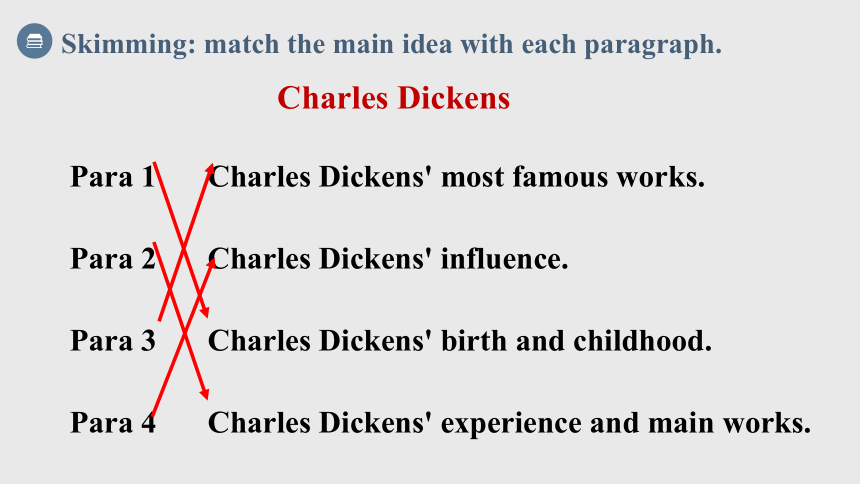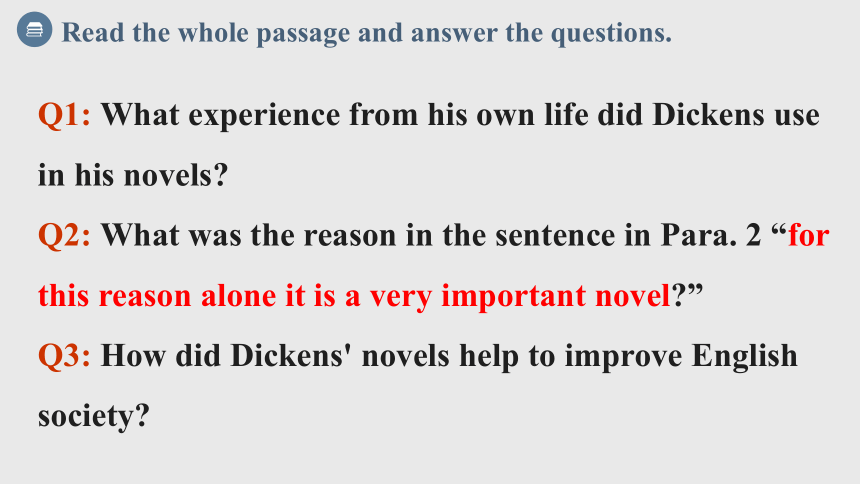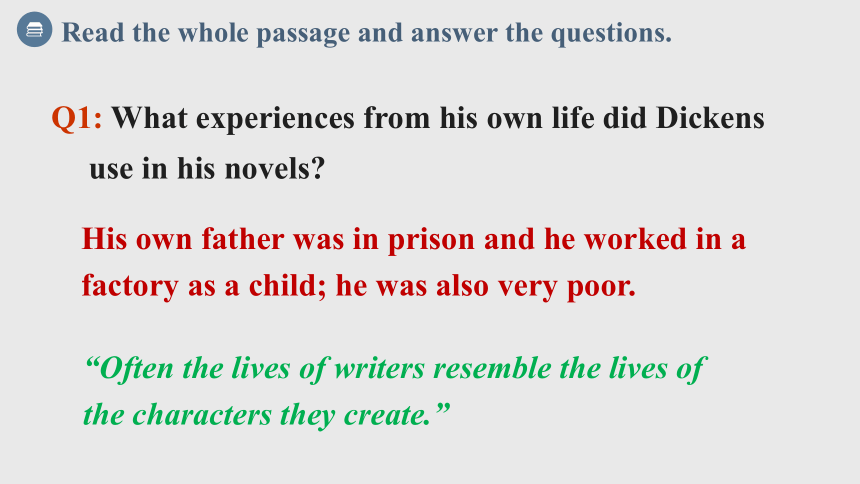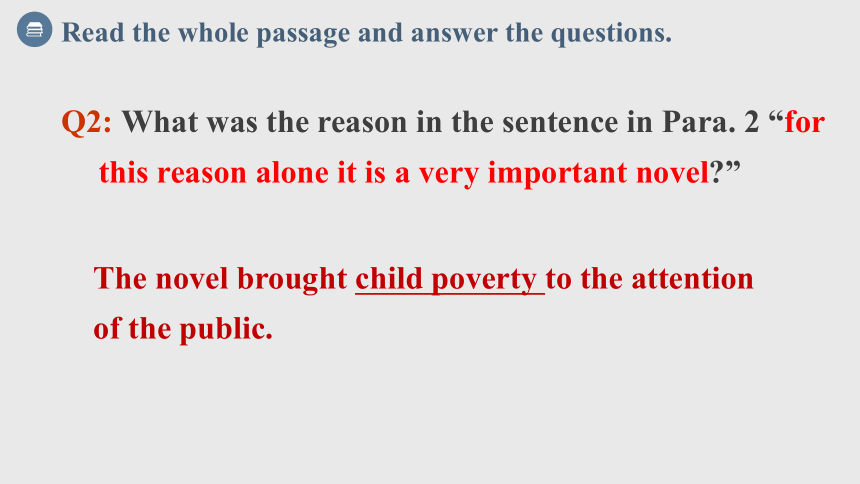外研版选修七Module 3 Introduction Cultural Corner 课件(15张ppt)
文档属性
| 名称 | 外研版选修七Module 3 Introduction Cultural Corner 课件(15张ppt) |

|
|
| 格式 | pptx | ||
| 文件大小 | 382.5KB | ||
| 资源类型 | 教案 | ||
| 版本资源 | 外研版 | ||
| 科目 | 英语 | ||
| 更新时间 | 2023-02-04 20:19:53 | ||
图片预览







文档简介
(共15张PPT)
Literature
module 3
Charles Dickens
(1812-1870)
He is Queen Victoria’s favorite writer.
(1837-1901)
He is the only one who is as great as Shakespeare in the history of British literature.
His personal experiences are as exciting as those of his characters in his novel.
Para 1 Charles Dickens' most famous works.
Para 2 Charles Dickens' influence.
Para 3 Charles Dickens' birth and childhood.
Para 4 Charles Dickens' experience and main works.
Skimming: match the main idea with each paragraph.
Charles Dickens
Scanning: fill in the chart.
Charles Dickens Year of birth and death
Birth place
His family His father ___________________
His childhood __________ and _________
When he was young Working as _________________
Starting writing
Masterpieces
His influences His books are ________ in __________
1812-1870
London
was put in prison
unhappy
poor
a political journalist
in his early thirties
Oliver Twist
David Copperfield
A Tale of Two Cities
Great Expectations
popular
America and England
Read the whole passage and answer the questions.
Q1: What experience from his own life did Dickens use in his novels
Q2: What was the reason in the sentence in Para. 2 “for this reason alone it is a very important novel ”
Q3: How did Dickens' novels help to improve English society
Q1: What experiences from his own life did Dickens use in his novels
His own father was in prison and he worked in a factory as a child; he was also very poor.
Read the whole passage and answer the questions.
“Often the lives of writers resemble the lives of the characters they create.”
Q2: What was the reason in the sentence in Para. 2 “for this reason alone it is a very important novel ”
The novel brought child poverty to the attention of the public.
Read the whole passage and answer the questions.
Q3: How did Dickens’ novels help to improve English society
They made people aware of child poverty and made them want to do something about it.
Read the whole passage and answer the questions.
1. 被投进监狱
2. 付清账单
3. 经历真正的贫困
4. 有充沛的精力
5. 三十出头
6. 找到一个温暖的家
7. 使某人关注某事
8. 只为这一个原因
9. 贫穷人的生活
10. 患心脏病
1. be put in/into prison
2. pay the bills
3. experience real poverty
4. have a huge amount of energy
5. in one`s early thirties
6. find a loving home
7. bring sth. to the attention of sb.
8. for this reason alone
9. the lives of the poor
10. have a heart attack
1. a huge amount of 大量的(+不可数名词)
a great deal of +不可数名词
a quantity of +不可数名词/可数名词
quantities of
plenty of +不可数名词/可数名词
a lot of +不可数名词/可数名词
a great many +可数名词
a number of +名词复数
2. bring sth. to the attention of sb.
使某人关注某事
相关短语:
draw one’s attention to sth.
attract/absorb/catch/draw one’s attention
pay attention to
focus attention on sth.
distract attention from sth.转移注意力
3. Some people believe that he had a heart attack…
此句可变化成:
It is believed that he had a heart attack...
He is believed to have a heart attack…
It was the best of times, it was the worst of times, it was the age of wisdom, it was the age of foolishness, it was the epoch of belief, it was the epoch of incredulity, it was the season of Light, it was the season of Darkness, it was the spring of hope, it was the winter of despair, we had everything before us, we had nothing before us, we were all going direct to Heaven, we were all going direct the other way -- in short, the period was so far like the present period, that some of its noisiest authorities insisted on its being received, for good or for evil, in the superlative degree of comparison only.
(from A Tale of Two Cities)
那是最美好的时代,那是最糟糕的时代;那是智慧的年头,那是愚昧的年头;那是信仰的时期,那是怀疑的时期;那是光明的季节,那是黑暗的季节;那是希望的春天,那是失望的冬天;我们全都在直奔天堂,我们全都在直奔相反的方向 --简而言之,那时跟现在非常相象,某些最喧嚣的权威坚持要用形容词的最高级来形容它。说它好,是最高级的;说它不好,也是最高级的。?
(摘自《双城记》)
参考译文
thanks
Literature
module 3
Charles Dickens
(1812-1870)
He is Queen Victoria’s favorite writer.
(1837-1901)
He is the only one who is as great as Shakespeare in the history of British literature.
His personal experiences are as exciting as those of his characters in his novel.
Para 1 Charles Dickens' most famous works.
Para 2 Charles Dickens' influence.
Para 3 Charles Dickens' birth and childhood.
Para 4 Charles Dickens' experience and main works.
Skimming: match the main idea with each paragraph.
Charles Dickens
Scanning: fill in the chart.
Charles Dickens Year of birth and death
Birth place
His family His father ___________________
His childhood __________ and _________
When he was young Working as _________________
Starting writing
Masterpieces
His influences His books are ________ in __________
1812-1870
London
was put in prison
unhappy
poor
a political journalist
in his early thirties
Oliver Twist
David Copperfield
A Tale of Two Cities
Great Expectations
popular
America and England
Read the whole passage and answer the questions.
Q1: What experience from his own life did Dickens use in his novels
Q2: What was the reason in the sentence in Para. 2 “for this reason alone it is a very important novel ”
Q3: How did Dickens' novels help to improve English society
Q1: What experiences from his own life did Dickens use in his novels
His own father was in prison and he worked in a factory as a child; he was also very poor.
Read the whole passage and answer the questions.
“Often the lives of writers resemble the lives of the characters they create.”
Q2: What was the reason in the sentence in Para. 2 “for this reason alone it is a very important novel ”
The novel brought child poverty to the attention of the public.
Read the whole passage and answer the questions.
Q3: How did Dickens’ novels help to improve English society
They made people aware of child poverty and made them want to do something about it.
Read the whole passage and answer the questions.
1. 被投进监狱
2. 付清账单
3. 经历真正的贫困
4. 有充沛的精力
5. 三十出头
6. 找到一个温暖的家
7. 使某人关注某事
8. 只为这一个原因
9. 贫穷人的生活
10. 患心脏病
1. be put in/into prison
2. pay the bills
3. experience real poverty
4. have a huge amount of energy
5. in one`s early thirties
6. find a loving home
7. bring sth. to the attention of sb.
8. for this reason alone
9. the lives of the poor
10. have a heart attack
1. a huge amount of 大量的(+不可数名词)
a great deal of +不可数名词
a quantity of +不可数名词/可数名词
quantities of
plenty of +不可数名词/可数名词
a lot of +不可数名词/可数名词
a great many +可数名词
a number of +名词复数
2. bring sth. to the attention of sb.
使某人关注某事
相关短语:
draw one’s attention to sth.
attract/absorb/catch/draw one’s attention
pay attention to
focus attention on sth.
distract attention from sth.转移注意力
3. Some people believe that he had a heart attack…
此句可变化成:
It is believed that he had a heart attack...
He is believed to have a heart attack…
It was the best of times, it was the worst of times, it was the age of wisdom, it was the age of foolishness, it was the epoch of belief, it was the epoch of incredulity, it was the season of Light, it was the season of Darkness, it was the spring of hope, it was the winter of despair, we had everything before us, we had nothing before us, we were all going direct to Heaven, we were all going direct the other way -- in short, the period was so far like the present period, that some of its noisiest authorities insisted on its being received, for good or for evil, in the superlative degree of comparison only.
(from A Tale of Two Cities)
那是最美好的时代,那是最糟糕的时代;那是智慧的年头,那是愚昧的年头;那是信仰的时期,那是怀疑的时期;那是光明的季节,那是黑暗的季节;那是希望的春天,那是失望的冬天;我们全都在直奔天堂,我们全都在直奔相反的方向 --简而言之,那时跟现在非常相象,某些最喧嚣的权威坚持要用形容词的最高级来形容它。说它好,是最高级的;说它不好,也是最高级的。?
(摘自《双城记》)
参考译文
thanks
